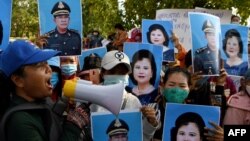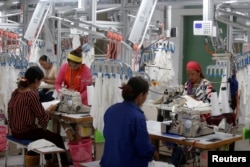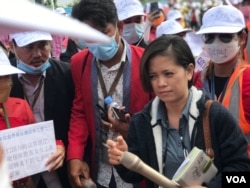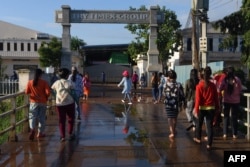PHNOM PENH — After working for two years as a shoe trimmer at Pontus Footwear factory in Takeo province, Kem Saory could not endure the working conditions any longer. He decided to create a union with nine colleagues in order to demand improvements in accordance with their labor rights.
Kem Saory, 37, knew he was risking his $200-per-month job from the factory, which he needed to support his wife, eight-year-old son and baby girl, but hoped that the Taiwanese-owned supplier of international shoe brands such as Puma and Timberland would respond positively.
He announced in a letter on Dec. 1, 2022, to management at the factory, located around 70 kilometers south of the capital Phnom Penh, that he was the head of a new, independent union. About three weeks later he and three other unionists were being let go by the company, which said in a letter dated Jan. 24, 2023, and seen by VOA Khmer, only that their fixed-duration contracts expired and were not being renewed.
“It is certain that the factory doesn’t want our independent union to exist in the factory. That’s why they rejected it and fired us,” Kem Saory told VOA Khmer, adding that the six other unionists feared they would be the next to be let go.
A spate of firings of unionists
A labor rights group said Pontus was one of three garment factories in recent months that have forced out a total of 20 workers for attempting to unionize. The others were T-Win Co. Ltd. in Takeo province, which reportedly supplies international brands Skechers, Nike and 5.11 Inc., and Caswell Apparel Co., Ltd. in Phnom Penh.
Another ongoing dispute concerns three workers who were fired in 2022 after attempting to form a union at Cinlon International factory in Kampong Speu province. The Chinese-owned factory produces bags for the California-based brand Clevermade. The Ministry of Labor instructed the company in July 2022 to reinstate the workers, but labor activists said that the factory failed to do so.
“Freedom of creating local unions has been a challenge for workers lately,” Pav Sina, president of the Collective Union of Movement of Workers (CUMW), said in a statement on 15 Feb. “[The workers] formed a union within the company for the rights and freedoms of workers as stated in Cambodian law,” he said, adding that union founders are protected by law, “[h]owever, the companies do not care about the law.”
The recently dismissed unionists jointly submitted letters of complaint on March 6 to the Ministry of Labor requesting intervention in order to force factory owners to rehire them and to respect the law.
Labor Ministry spokesman Heng Sour told VOA Khmer that the ministry was assessing the complaints and urged this reporter to be skeptical of the complaints of individual labor activists as they are “not the authority.”
Kaing Monika, deputy secretary-general of Garment Manufacturers Association in Cambodia, referred questions about the disputes to the ministry, adding,“Any action on non-compliance [with labor laws], if any, would be dealt with by the ministry.”
‘Pervasive problems of union-busting’
A November 2022 Human Rights Watch (HRW) report said Cambodia suffered from “longstanding and pervasive problems of union-busting” by factory owners. It warned independent unionization was becoming even harder in recent years as Prime Minister Hun Sen’s government deepened repression of civil society, including labor rights activists, and failed to uphold laborers’ protections under law.
The report documented five cases of factories carrying out unfair dismissals and mass layoffs targeting union leaders and activist members in garment, casino and tourism sectors. It said factories use fixed-duration contracts that last several months and can be renewed for up to two years. This practice makes workers vulnerable to non-renewal in case they unionize or can be used to discriminate against workers.
The United States-based group said the government often rejected the registration of independent unions or their requests for collective labor dispute settlement by the Arbitration Council, while the ruling Cambodian People’s Party has long created unions beholden to it. HRW said authorities and police were also banning labor strikes and arresting protesters, while prosecuting labor leaders on “baseless charges.”
Chhim Sithar, president of the Labor Rights Supported Union of Khmer Employees of NagaWorld Casino, led protests against mass layoffs during the pandemic. She was charged last year with “incitement to commit a felony” under the Criminal Code and released on bail in March 2022 after 74 days in pretrial detention.
Discrimination, poor working conditions and controlled unions
Kem Saory said he was motivated to unionize at Pontus Factory after a colleague’s fixed-duration contract was not renewed in September 2022 because she became pregnant—a form of discrimination he wanted to prevent. “She needs to support her life and the baby’s. Thus, the company shouldn’t fire a pregnant worker by using some excuse to end the contract… It is unfair and violates law,” he said.
Kem Saory said he hopes the Labor Ministry will intervene and force the factory to accept the union and reinstate him. In the meantime, he works as a car cleaner at a relative’s service store for $5 per day and his wife runs a small shop from their home. “There are a lot of challenges. But I don’t abandon my will. What I do is for the benefit of many workers, so I can bear these difficulties for a short time,” he said.
Pontus factory didn’t respond to VOA Khmer’s inquiries. It is registered to Taiwanese national Hsi-Tsung Wang and listed as a supplier to VF Corporation. In 2018, it produced shoes for the companies Timberland, Puma, 5.11 Inc. and Skechers USA Inc., according to the Center for Alliance of Labor and Human Rights.
Hang Yorn, 43, earned $600 per month as a supervisor at Caswell Apparel Co. Ltd, but was among three workers fired on Jan. 18, 2023, shortly after she and eight other workers announced the creation of an independent union.
Existing unions at the factory, she said, “are 100 percent agreeable with the company. So, they don’t see any injustice for workers.” Hang Yorn feared that because of her age she would not get hired again elsewhere and she will struggle to support her family with three children.
Hok Sokheng, 38, said she and nine other workers were let go from T-Win garment factory only six days after they announced their plan to unionize on Feb. 8, 2023, in order to address poor working conditions, such as pressure from management on workers to put in long working hours.
T-Win garment factory didn’t respond to questions from VOA Khmer.
International brands
Phil Robertson, deputy director at HRW’s Asia Division, told VOA Khmer that international brands should take note of recent disputes and act against the deterioration of labor rights in Cambodia’s garment sector.
“The only organizations that the government, and these problematic factory owners targeting unionists, will listen to are the brands who bring the orders and the money to sustain the garment industry in the country,” he said.
“So it’s time for urgent action by the brands sourcing from these factories to demand reinstatement of all workers fired for organizing and establishing a union, and pressure the government to uphold labor rights in the country.”
CUMW president Pav Sina on Feb. 27 called on Nike to investigate the alleged union suppression at T-Win Garment Cambodia Co., Ltd., which was under the auspices of the Top Summit factory, for any violations of Nike’s own code of conduct which ensures that the workers entitled to standard working conditions, rights and freedoms and a decent standard of living.
A Nike company spokesperson did not reply to VOA Khmer’s queries about the case.







